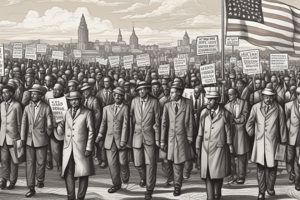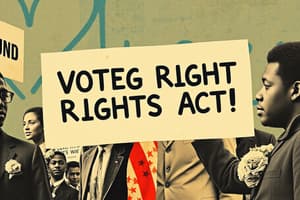Podcast
Questions and Answers
What does the Voting Rights Act of 1965 prohibit?
What does the Voting Rights Act of 1965 prohibit?
- Federal oversight of elections
- Discriminatory practices
- Both A and B (correct)
- Literacy tests
What power did the Voting Rights Act of 1965 give the Federal Government regarding elections?
What power did the Voting Rights Act of 1965 give the Federal Government regarding elections?
The Federal Government has power regarding all elections held anywhere in the country.
No State may deprive a citizen of the right to vote on the basis of sex.
No State may deprive a citizen of the right to vote on the basis of sex.
True (A)
Why do States have little discretion regarding age qualifications for voting?
Why do States have little discretion regarding age qualifications for voting?
Which age group is less likely to vote?
Which age group is less likely to vote?
What is the MOST ACCURATE generalization about voter registration?
What is the MOST ACCURATE generalization about voter registration?
What is the Court taking a stand against in their decision regarding voter qualifications?
What is the Court taking a stand against in their decision regarding voter qualifications?
What is one common characteristic of nonvoters?
What is one common characteristic of nonvoters?
Which demographic is MOST LIKELY to vote Democratic?
Which demographic is MOST LIKELY to vote Democratic?
What method of voting does a photograph likely show if it features a mail-in ballot?
What method of voting does a photograph likely show if it features a mail-in ballot?
Which example qualifies as public opinion?
Which example qualifies as public opinion?
How can Thomas Jefferson's statement about government and newspapers be summarized?
How can Thomas Jefferson's statement about government and newspapers be summarized?
What is required to be an informed citizen today?
What is required to be an informed citizen today?
What best summarizes the differences between political parties and interest groups?
What best summarizes the differences between political parties and interest groups?
What is a challenge for pollsters regarding public opinion?
What is a challenge for pollsters regarding public opinion?
Why are political parties essential to democratic government?
Why are political parties essential to democratic government?
How do parties act as a bonding agent for their candidates?
How do parties act as a bonding agent for their candidates?
Minor party candidates have a real chance of winning elections.
Minor party candidates have a real chance of winning elections.
What does George Washington's quotation about political factions imply?
What does George Washington's quotation about political factions imply?
What does the map of the 1900 presidential election indicate about political parties?
What does the map of the 1900 presidential election indicate about political parties?
According to the chart, what can be said about minor parties?
According to the chart, what can be said about minor parties?
What event does the photograph most likely depict?
What event does the photograph most likely depict?
What role are these party members performing?
What role are these party members performing?
What is the reason for using petitions primarily at the local level?
What is the reason for using petitions primarily at the local level?
How does a direct primary differ from a caucus?
How does a direct primary differ from a caucus?
What phrase BEST describes the presidential primary in some States?
What phrase BEST describes the presidential primary in some States?
What is the BEST description of a candidate's body language and posture during a campaign?
What is the BEST description of a candidate's body language and posture during a campaign?
What is the event depicted in the image likely related to?
What is the event depicted in the image likely related to?
What does the map indicate about political party dominance?
What does the map indicate about political party dominance?
Why might Congress limit the Federal Election Commission's powers?
Why might Congress limit the Federal Election Commission's powers?
What does the Constitution say about suffrage qualifications?
What does the Constitution say about suffrage qualifications?
Describe the difference between a direct primary and a general election.
Describe the difference between a direct primary and a general election.
Flashcards are hidden until you start studying
Study Notes
Voting Rights and Legislation
- The Voting Rights Act of 1965 prohibited literacy tests and discriminatory practices affecting voting access.
- The Act empowered the Federal Government to regulate elections nationwide.
- States cannot deny a citizen's right to vote based on sex, ensuring gender equality in suffrage.
Voter Eligibility and Participation
- Voting qualifications include citizenship, residence, and a minimum age of 18 as dictated by the Constitution.
- Young voters aged 18-20 tend to have lower turnout rates compared to older age groups.
- Voter registration aims to prevent fraud but could be made more accessible for potential voters.
Court Rulings and Public Sentiment
- Supreme Court opinions have challenged poll taxes, asserting that wealth should not determine voting qualifications.
- Nonvoters often exhibit mistrust toward political institutions, affecting their civic participation.
Political Parties and Elections
- Democratic Party support is more common among certain demographics, such as a 25-year-old African American woman from Boston.
- Political parties are crucial for connecting elected officials with their constituents and ensuring candidate accountability.
Media and Public Opinion
- Public opinion can be represented by various forms, including the views of media figures on policy issues.
- A free press is vital for democracy, as indicated by Thomas Jefferson's preference for newspapers over government.
Election Processes
- Polls are challenged by difficulties in ensuring randomness in their samples, impacting public opinion measures.
- Minor parties may occasionally gain electoral votes, although they often struggle to win major elections.
Primary Elections and Candidate Selection
- Direct primaries are open to all registered party voters, unlike caucuses which are more exclusive.
- Candidate selection processes often involve conventions where delegates nominate candidates.
Campaign Dynamics
- Body language and posture can influence public perception during a candidate's campaign.
- Campaign rallies serve as important events for candidates to engage with voters and create visibility.
Constitutional Foundations
- The Constitution outlines suffrage qualifications, reinforcing the Federal Government's role in ensuring equal voting rights.
- Changes in voting laws reflect an inclusive approach to democracy, emphasizing age and equality as fundamental principles.
Distinctions in Election Types
- Direct primaries are internal party elections to select candidates, while general elections determine public office winners.
Studying That Suits You
Use AI to generate personalized quizzes and flashcards to suit your learning preferences.




